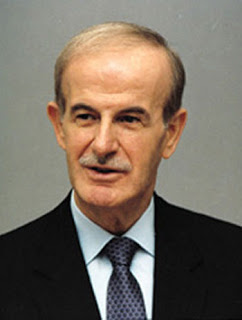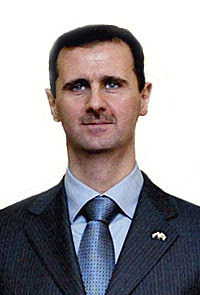 |
| Father & Son – Bashir and Hafez al-Assad |
& the Vortex of Terror
I went to a
meeting tonight at Sussex University to hear Robin Yassin-Kassab, who is of mixed Syrian and English parentage, speak about the Syrian revolution and
what has gone wrong. Sponsored by Sussex
Friends of Syria society it was both illuminating and depressing.
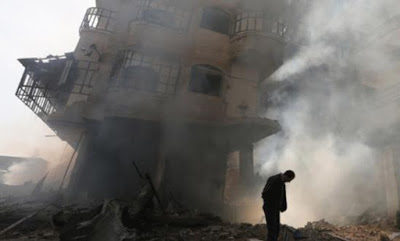 |
| Devastation in the Syrian civil war |
Robin is the
co-author of a new book Burning
Country
about the Syrian revolution.
 |
| Robin Yassin-Kassab |
The problem with the meeting was the controlled nature of the ‘conversation’ whereby an interlocutor
posed a number of questions throughout, leaving little time for genuine
discussion. Unfortunately Robin chose to shield himself,
via his interlocutor, from criticism.
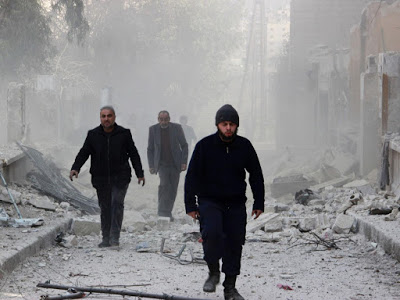 |
| Syria Anadolu |
It is somewhat unfortunate that the Sussex Friends of Syria Society felt the
need to protect Robin from criticism. It suggests that he is not so confident of the case he makes when subject to challenge. Despite criticism of him as a war-monger by a number of people, I went
with an open mind. I went away with a number of doubts as to his motives and political position, not least in view of his repeated attack on ‘leftists’ – as if there was a unified left position on Syria and in particular his support for Turkey’s attacks on the Kurds.
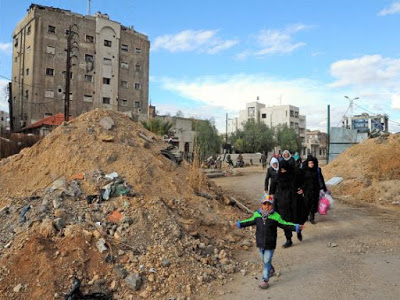 |
| Damascus |
Robin
Yassin-Kassab clearly has an encyclopedic knowledge of Syria and the different
groups. His knowledge of the
revolutionary councils and the Syrian civil society, the democratic formations
that have been thrown up in the struggle against the Assad regime is
impressive. What is less than impressive
is his political judgement.
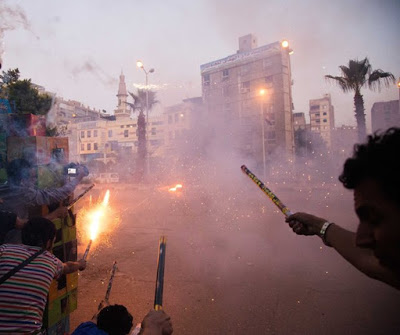 |
| Protests at death of 6 people in Egypt |
Robin accurately described the grisly record of the Syrian regime of
Bashir al-Assad and before that Haffez al-Assad. It
is a regime to which the United States rendered prisoners to be tortured [see Daraa protests are the spark Syria needed] like Maher Arar who was kidnapped
at John F Kennedy airport by US security and deported to Syria rather than Canada, even though he
was a dual Canadian-Syrian citizen. He
was tortured and detained for a year in Syria before being released back to Canada. The Canadian government compensated him for his terrible ordeal but it is noticeable that the US Courts refused to allow a
challenge to the actions of the US government.
It is a
regime which has used barrel bombs and poison gas against civilians and which
has killed the vast majority of the 250,000 people estimated to have died in
the civil war, which uses torture as a matter of course and which ‘disappears’
those it tortures and kidnaps.
No one should
believe that the road to revolution or peace in the Middle East goes through
the Assad regime.
Likewise I
have no doubt that he is right to say that Assad deliberately stimulated the
growth of the Jihadi groups in Syria, both as a means of confessionalising the
struggle and as a way of painting himself as the bulwark against Islamic
terrorism. He did this by, amongst other
things, releasing some 1,500 Islamists in 2011 at the same time as he was slaughtering
demonstrators on the street.
There is also
no doubt that the Russian intervention and bombing on the side of Assad has
made the situation far worse and further that their intense bombing, which has
primarily targeted the civilian resistance against Assad has caused mass civilian casualties. The Russian bombing
has been targeted at civilian structures – schools, clinics and homes – and as
such they have been guilty of war crimes.
It is, in this context, a pity that Stop the War Coalition hasn’t been
more outspoken in condemning the Russian attacks. Propping up Assad is not an answer to the
present conflict.
I can even
accept that many people joined Islamist groups like Jaysh
al-Islam
and Ahrar ash-Sham as a consequence
of the oppressive qualities of the Assad regime. There is no doubt that the Free Syrian Army
or components thereof deserve support in their battles against both the Assad
regime and Isis, although the FSA have also allied with the Al Qaeda group
al-Nusra Front.
If this were all that Yassin-Kassab had to say about the struggle of the different groups in Syria, then he would be worth listening to.
What Yassin-Kassab fails to perceive in what was often a rant against ‘leftists’
was that the Syrian revolution takes place in a context, viz. that Israel in
particular wishes to see Syria split into its confessional parts – Sunni,
Alawite, Kurdish. A scenario that the
United States will not be disappointed with. In just the same way as the US attack on Iraq split the country into three and pitted Shi’ite against Sunni in a country where there had been little or no conflict between them before the invasion.
That is the context in which Hezbollah has come to the aid of the Assad
regime. It is also, to a lesser extent
the reason why the Iranian regime has become involved in propping up Assad.
For Israel and the United States, Hezbollah is undoubtedly the key target,
as it is the only force in the Arab world to have defeated Israel, in
2006. The strengthening of imperialism
will not, in the long terms, be of any comfort to the Syrian or the Iraq
people.
What I most took exception to was Yassin-Kassab’s support for Turkey’s
shelling of the Kurdish PYD, on the grounds that they were operating in Arab
areas and presumably because they were fighting some of the murderous Turkomen
groups. Yassin-Kassab also attacked the Kurdish
PKK which is fighting against the genocidal Turkish regime of Erdogan in the
South of Turkey. The PKK was a nasty
Marxist group from what I could ascertain rather than the self-defence group
that is overwhelmingly supported by the Kurdish people.
Whilst professing support for Kurdish self-determination Yassin-Kassab also
supports repression by the Turkish state, which is somewhat at odds with
support for the self-determination of the Syrian people. I wasn’t able to pursue the point because of
the vigilance of Yassin-Kassab’s protectors at the meeting which suggests that
this is rather a sore point.
I also interjected at the end of the meeting when Yassin-Kassab referred to fundamentalism
in the region. I pointed out that much of it was a product of a deliberate
strategy by the West. When I said that Saudi
Arabia was the fount of fundamentalism in the region Yassin-Kassab demurred and
when I pointed that the Saudi regime was a creation of British and then
American imperialism he sought to locate the rise of the regime in the 17th
century rather than as a product of the first world war and Britain’s
sponsorship of Ibn Saud, which included both finance and weaponry, in his battles against his rivals in Arabia, in particular Sharif Hussein of Mecca [see Israel andSaudi Arabia – The Roots of a Special Relationship]. It is indicative of the fact that
Yassin-Kassab fails to place the travails of the Syrian people in the context
of Western imperialism.
Tony
Greenstein
See After Tunisia: Robin Yassin-Kassab on Syria
and ‘I was terribly wrong’ – writers look back at the Arab spring five years on
Members
of Egyptian group Ultras Nahdawy during a demonstration against the death of six
people at anti-regime protests west of Cairo, July 2015. Photograph: Belal
Wagdy/Anadolu Agency/Getty Images
Robin Yassin-Kassab’s book Burning Country: Syrians in Revolution
and War, co‑written with Leila al-Shami, is published by Pluto.
